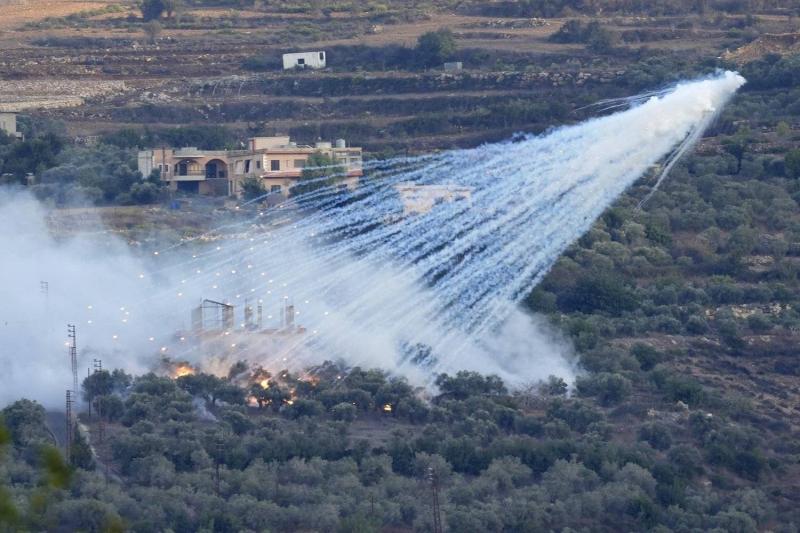The Minister of Agriculture in the caretaker government, Abbas al-Hajj Hassan, revealed that "the Israeli enemy bombed our agricultural lands in the south with internationally prohibited white phosphorus bombs, resulting in the total incineration of 2,400 dunams and partial damage to 6,700 dunams." In an interview with the Anadolu Agency, al-Hajj Hassan stated that "Lebanon is facing a comprehensive Israeli aggression against its products and farms, which has led to the death of 360,000 birds and 3,500 heads of goats, sheep, and cattle." He noted that "it is not just humans who have fallen victim to the Israeli bombing in southern Lebanon; farms have also faced attacks that have devastated the livelihoods of hundreds of families in border villages and towns."
He added, "Over the past years, agriculture has been the economic backbone of the Lebanese border villages, with the Marjeyoun and Wazzani plains being the most notable, supplying the local market with about 30 percent of its needs, while agriculture provides a source of income for approximately 70 percent of the southern population." He continued: "Israel bombed our agricultural lands in the south with internationally prohibited white phosphorus to cause maximum fires along the border."
He pointed out that "since October 8, farmers in the south have stopped going to their fields, suffering heavy losses due to the artillery shelling and air raids during which the Israeli enemy used phosphorus to inflict the greatest possible damage." He explained that "the Ministry of Agriculture is monitoring the Israeli attacks on Lebanese lands." He stated: "We are in a state of comprehensive Israeli aggression against our products, lands, farms, villages, and also against our human lives."
He noted that "the fires have wiped out two types of trees: the first category being fruit-bearing trees such as almonds, avocados, bananas, citrus in all forms, and ancient olive trees that are over 300 years old." He said: "The second category includes precious forestry or dye trees, especially ancient trees, some of which are over 2,000 to 3,000 years old, burnt by the Israeli enemy with internationally prohibited white phosphorus bombs."
He affirmed that "the Israeli enemy disregards all international treaties and resolutions," indicating that "Israel's actions are far removed from the strategy and tactics employed in wars and military operations." He spoke about the "significant damage in the livestock sector," saying: "We have farms that have been completely destroyed. More than 360,000 birds (poultry) have died, along with 3,500 heads of goats, sheep, and cattle, and 3,000 beehives."
He highlighted that "these farms were targeted by Israel not for any reason other than their proximity to the borders with occupied Palestine," stating: "The indirect damages to the sector include the degradation of agricultural infrastructure. This is a grim reality, but in return, there is resilience among our people, farmers, and livestock breeders, including every child, elder, and woman in the south."
He announced that "the Ministry of Agriculture is preparing a complaint through the Lebanese government and foreign ministry to the Security Council and effective international bodies in this regard to hold international organizations accountable." He said: "We also want to tell the world and the international community that Israel is an enemy, targeting stones, trees, and humans."
He added: "In late March, the Lebanese foreign ministry announced that Beirut had submitted 22 complaints to the Security Council against Israel since the beginning of its attacks on Lebanon in October." He mentioned that "agriculture in the south constitutes 20 percent of the national product," stating: "The front is burning over an area of 210 km (length of the border between Lebanon and occupied Palestine), thus most of the areas are agricultural and depend on farming."
He noted that "current production rates, during the war, in those areas do not exceed 30 percent," saying: "This is a good situation for Lebanon compared to what is happening on the Israeli side, where there are areas estimated in the thousands of hectares that have been abandoned."
He went on to say: "The government will not wait until after the war. Therefore, we have started planning since the first day; it is a gradual plan based on the scenario that the Israeli enemy is preparing for, whether it be a partial or comprehensive war."
He added: "As soon as hostilities cease, we will be on the ground with our teams and other organizations present in Lebanon, both private and governmental, for relief purposes, to assess damages and establish a compensation mechanism."
Haj Hassan concluded: "Despite the war being waged against us, we are committed to our right to defend ourselves, a sacred right for us through resistance and the army and the people, thus it is also our duty to stand by our people and farmers in compensating them."




